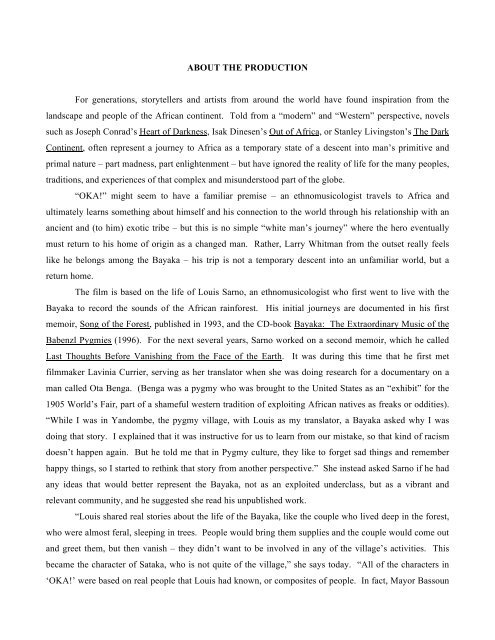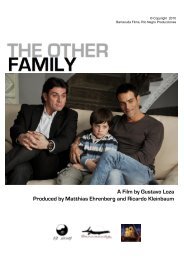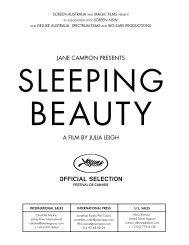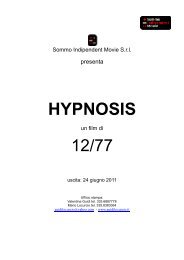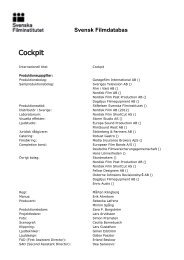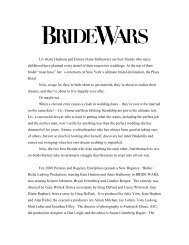A film by Lavinia Currier Based on the memoir by Louis ... - FDb.cz
A film by Lavinia Currier Based on the memoir by Louis ... - FDb.cz
A film by Lavinia Currier Based on the memoir by Louis ... - FDb.cz
You also want an ePaper? Increase the reach of your titles
YUMPU automatically turns print PDFs into web optimized ePapers that Google loves.
ABOUT THE PRODUCTION<br />
For generati<strong>on</strong>s, storytellers and artists from around <strong>the</strong> world have found inspirati<strong>on</strong> from <strong>the</strong><br />
landscape and people of <strong>the</strong> African c<strong>on</strong>tinent. Told from a “modern” and “Western” perspective, novels<br />
such as Joseph C<strong>on</strong>rad’s Heart of Darkness, Isak Dinesen’s Out of Africa, or Stanley Livingst<strong>on</strong>’s The Dark<br />
C<strong>on</strong>tinent, often represent a journey to Africa as a temporary state of a descent into man’s primitive and<br />
primal nature – part madness, part enlightenment – but have ignored <strong>the</strong> reality of life for <strong>the</strong> many peoples,<br />
traditi<strong>on</strong>s, and experiences of that complex and misunderstood part of <strong>the</strong> globe.<br />
“OKA!” might seem to have a familiar premise – an ethnomusicologist travels to Africa and<br />
ultimately learns something about himself and his c<strong>on</strong>necti<strong>on</strong> to <strong>the</strong> world through his relati<strong>on</strong>ship with an<br />
ancient and (to him) exotic tribe – but this is no simple “white man’s journey” where <strong>the</strong> hero eventually<br />
must return to his home of origin as a changed man. Ra<strong>the</strong>r, Larry Whitman from <strong>the</strong> outset really feels<br />
like he bel<strong>on</strong>gs am<strong>on</strong>g <strong>the</strong> Bayaka – his trip is not a temporary descent into an unfamiliar world, but a<br />
return home.<br />
The <str<strong>on</strong>g>film</str<strong>on</strong>g> is based <strong>on</strong> <strong>the</strong> life of <strong>Louis</strong> Sarno, an ethnomusicologist who first went to live with <strong>the</strong><br />
Bayaka to record <strong>the</strong> sounds of <strong>the</strong> African rainforest. His initial journeys are documented in his first<br />
<strong>memoir</strong>, S<strong>on</strong>g of <strong>the</strong> Forest, published in 1993, and <strong>the</strong> CD-book Bayaka: The Extraordinary Music of <strong>the</strong><br />
Babenzl Pygmies (1996). For <strong>the</strong> next several years, Sarno worked <strong>on</strong> a sec<strong>on</strong>d <strong>memoir</strong>, which he called<br />
Last Thoughts Before Vanishing from <strong>the</strong> Face of <strong>the</strong> Earth. It was during this time that he first met<br />
<str<strong>on</strong>g>film</str<strong>on</strong>g>maker <str<strong>on</strong>g>Lavinia</str<strong>on</strong>g> <str<strong>on</strong>g>Currier</str<strong>on</strong>g>, serving as her translator when she was doing research for a documentary <strong>on</strong> a<br />
man called Ota Benga. (Benga was a pygmy who was brought to <strong>the</strong> United States as an “exhibit” for <strong>the</strong><br />
1905 World’s Fair, part of a shameful western traditi<strong>on</strong> of exploiting African natives as freaks or oddities).<br />
“While I was in Yandombe, <strong>the</strong> pygmy village, with <strong>Louis</strong> as my translator, a Bayaka asked why I was<br />
doing that story. I explained that it was instructive for us to learn from our mistake, so that kind of racism<br />
doesn’t happen again. But he told me that in Pygmy culture, <strong>the</strong>y like to forget sad things and remember<br />
happy things, so I started to rethink that story from ano<strong>the</strong>r perspective.” She instead asked Sarno if he had<br />
any ideas that would better represent <strong>the</strong> Bayaka, not as an exploited underclass, but as a vibrant and<br />
relevant community, and he suggested she read his unpublished work.<br />
“<strong>Louis</strong> shared real stories about <strong>the</strong> life of <strong>the</strong> Bayaka, like <strong>the</strong> couple who lived deep in <strong>the</strong> forest,<br />
who were almost feral, sleeping in trees. People would bring <strong>the</strong>m supplies and <strong>the</strong> couple would come out<br />
and greet <strong>the</strong>m, but <strong>the</strong>n vanish – <strong>the</strong>y didn’t want to be involved in any of <strong>the</strong> village’s activities. This<br />
became <strong>the</strong> character of Sataka, who is not quite of <strong>the</strong> village,” she says today. “All of <strong>the</strong> characters in<br />
‘OKA!’ were based <strong>on</strong> real people that <strong>Louis</strong> had known, or composites of people. In fact, Mayor Bassoun


